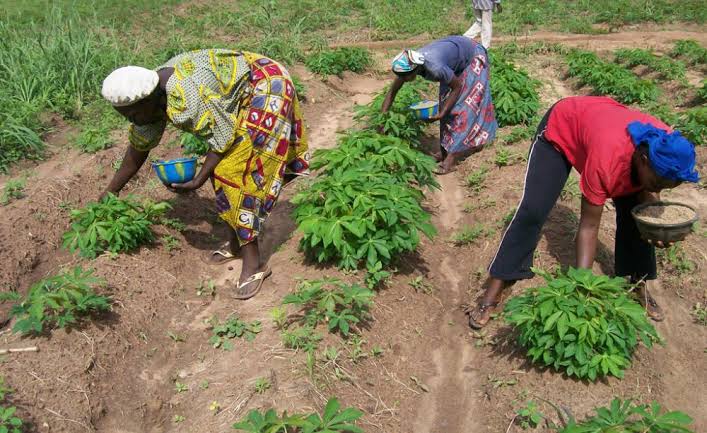The flag-off of the 1.25 million metric tonnes dry-season wheat production in 2023 has raised expectations and hope that the federal government will increase food output to offset rising food prices.
Wheat remains one of the key staple crops that feed millions of Nigerians including being the major ingredient in the production of wide range of foods such as bread, pasta, noodles, biscuits, cakes, and pastries.
According to data by the Observatory of Economic Complexity (OEC), in 2021 alone, Nigeria imported $3.32billion in wheat, making the country the 2nd largest importer of wheat in the world, primarily from Lithuania ($582m), Latvia ($508m), United States ($508m), Russia ($493m), and Ukraine ($490m).
Even, the Russia – Ukraine war has exacerbated the high price of the product as the country is projected to import about 5.4 million tonnes of wheat in 2023-2024.
The situation is one of the reasons the federal government is pushing to increase domestic wheat production to ensure self-sufficiency and to drive the state of emergency on food security declared by President Bola Tinubu in July, 2023.
The Federal Ministry of Agriculture and Food Security has commenced the pilot cultivation of the targeted 250,000 hectares of wheat production for the 2023 dry-season farming in Kadume, Hadejia local government area of Jigawa State.
The project which is under the National Agricultural Growth Scheme and Agro-pocket Project (NAGS&AP) was made possible by a $134million loan facility advanced to Nigeria by the African Development Bank(AfDB) and aimed to increase yield of major staple crops such as rice, cassava, maize, wheat among others by at least 20 per cent.
At the flag-off, minister of agriculture and food security, Abubakar Kyari described the project as ambitious, saying that the ministry aim to support between 150,000 to 250,000 farmers with 50 per cent input subsidy to cultivate between 200,000 to 250,000 hectares of wheat with an expected yield of 1,250,000 metric tonnes.
In Jigawa State alone, the programme is expected to expand the capacity of over 42,000 smallholder farmers who have been assisted with inputs such as fertiliser, certified wheat seeds and herbicides.
The minister said that the move was to significantly reduce food inflation, Nigeria’s dependence on foreign import, increase domestic consumption and ultimately promote agricultural self-sufficiency and stimulate economic growth.
According to him, the project encapsulates President Bola Tinubu administration’s resolve to expand the capacity of farmers to engage in the cultivation of key staples across the country.
Kyari added that the programme will be technology enabled, thus guaranteeing transparency and accountability in the provision of the subsidy and other support services like extension, insurance and additional finance. He noted that the government remains committed to ensure that the support does get to the farmer accordingly.
By force of its very essence, he said, that the dry season farming offers us a unique opportunity to harness the untapped potential of land and diversify Nigeria’s food production capabilities. The minister stressed that the importance of the farming by this time cannot be overstated, as it allows the federal government to overcome seasonal limitations and meet the demands of the country’s growing population while bolstering national economy.
“Our farmers remain our most prized assets as a nation, given that they produce the bulk of the food consumed in-country. As such, Mr. President has charged us to ensure that they are adequately supported to increase their productivity.
“Equally, our farmers are guaranteed access to improved seeds in this particular instance, I would like to point out that we are deploying heat tolerant wheat varieties like Borlaug 100; Attila etc and we will progressively invest in irrigation infrastructure projects to optimise water usage and mitigate the challenges posed by the dry season.
“We are poised to take them on. We have been innovative in utilising Information and Communication Technology (ICT) to target already proven irrigated farm clusters; deploy verified farmer data; and map the farmers to agro dealer redemption centers.
“We will invest more in farm infrastructure, all with a view to enabling our farmers maximise their agricultural output and overcome the limitations imposed by the elements.
“I implore all stakeholders, from farmers to researchers, private sector entities to civil society organisations, to come together and seize the opportunity presented by this 2023 dry season farming initiative. Let us work hand in hand, united in purpose, to usher in a new era of agricultural prosperity,” he added.
The Jigawa State governor, Mallam Umar Namadi, who applauded the programme noted that the 2023 dry-season wheat production in the state was a crucial initiative for food security, economic diversification, and citizen empowerment.
Namadi said the programme remains in alliance with President Bola Ahmed Tinubu’s Renewed Hope Agenda and the State’s 12-Point Agenda for Greater Jigawa.
The governor reiterated that the state government will provide free high-quality extension services to wheat farmers, with arrangements for the engagement and training of additional 1,440 extension agents for farmers to adhere to the guidance provided by extension agents for the success of the programme.





